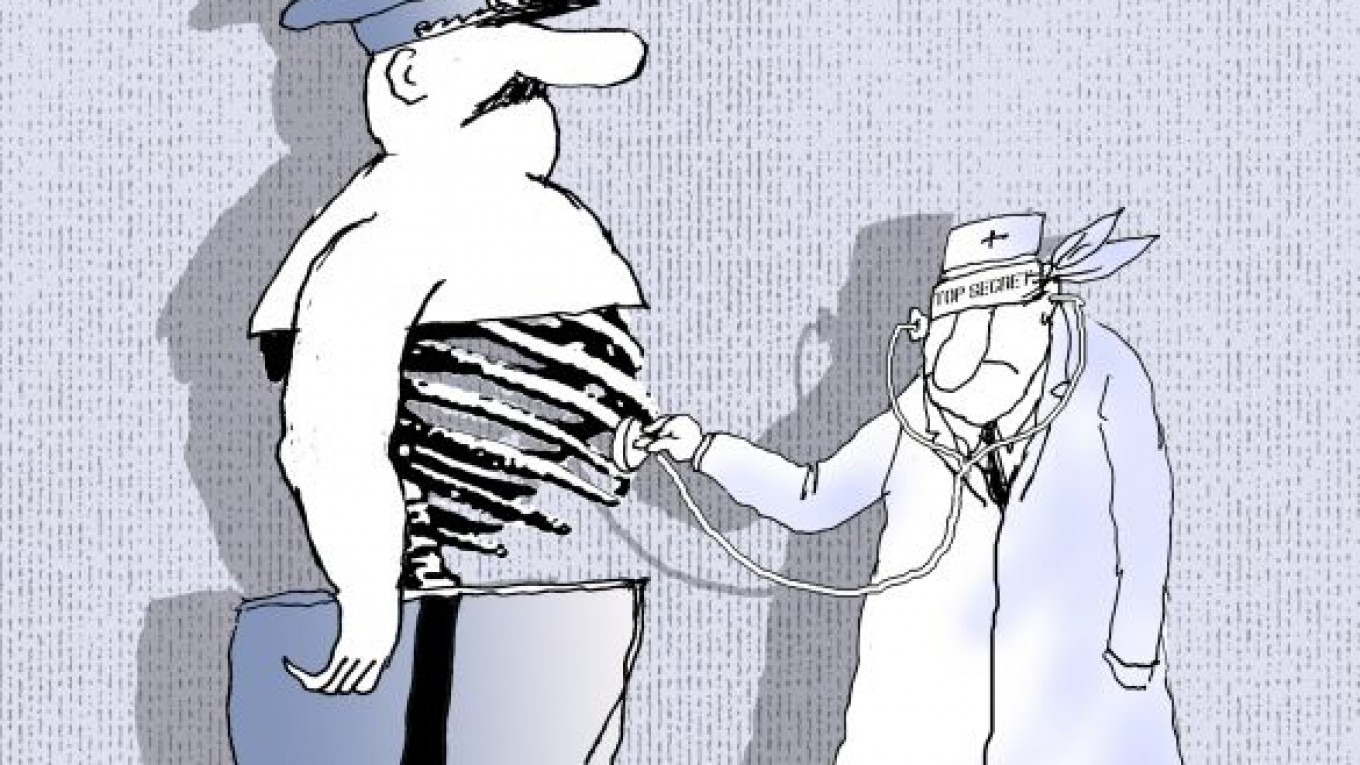Even the most talented playwright couldn't have written this scenario. Take, for example, Defense Minister Sergei Shoigu, who apparently hoped to set an example of transparency and openness. Not only was he one of the first to fulfill President Vladimir Putin's order last year to develop a plan for modernizing the armed forces, but he even posted portions of his modernization plan on his website.
Russia has proven unable to produce any technologically complex product, whether it be ships, aircraft, reactors, turbines or engines.
The section devoted to upgrading the army was particularly interesting. Rather than spell out what quantities of which weapons would be delivered each year, the plan offered only one strange figure: the percentage of new equipment for each type of weapon. Of course, this number should increase from year to year. But it is almost impossible to ascertain exactly how many weapons must be delivered, making it easy to conceal future failures and shortfalls. But Valery Gerasimov, head of the General Staff, clarified that to fulfill the plan, Russia had to produce 70 to 100 aircraft, more than 120 helicopters, eight or nine submarines and up to 600 armored vehicles by 2020.
Deputy Prime Minister Dmitry Rogozin, who oversees the defense industry, has been quick to explain how that industry would be able to carry out such an over-ambitious plan, basing his optimism on past production growth in the defense sector. At the same time, he did not indicate whether that growth had been maintained during the current economic stagnation and whether it applied to the actual production of aircraft, helicopters and tanks. The growth figures could be misleading if they are based only mainly on the increase in end costs, as Finance Minister Anton Siluanov has suggested. What's more, Deputy Economic Development Minister Andrei Klepach sounded somewhat out of place when he said, "If you realistically analyze the financial condition of almost all leading Russian defense companies, you see that they are either close to bankruptcy or not far from it."
To deflect attention away from production shortfalls, Rogozin has focused on the country's supposed vulnerability to a U.S. attack. According to Rogozin, the U.S. Prompt Global Strike program — which, if realized, is supposed to place conventional warheads on high-precision strategic delivery vehicles — will be able to destroy up to 90 percent of Russia's nuclear forces. This is complete nonsense. Moreover, Rogozin also argues that this attack could be delivered in an hour's time by the 4,000 or so strategic delivery vehicles that the United States possesses. But in reality, the U.S. has only about 1/4 of this number.
This begs the question: Why try to fulfill the modernization plan if the U.S., through its Prompt Global Strike and missile defense capabilities, can supposedly nullify any advantage gained from Russia's latest technologies?
Rogozin all but admitted this when he said last week at a conference devoted to Putin's presidential campaign article titled "Be Strong: National Security Guarantees for Russia" published in early 2012: "The Russian economy is 10 times smaller than the U.S. economy. Moreover, Russia's scientific potential was practically destroyed after the collapse of the Soviet Union, leaving it decades behind leading Western countries in a number of critical core technologies."
No sooner had Rogozin uttered these words than the Proton-M rocket launched from Baikonur exploded last week only seconds into its flight. The situation has become so bad with Russia's space program that these kind of human disasters are becoming the norm, while successful launches are the exception. And failed rocket launches are only the tip of the iceberg. Incompetence, corruption, substandard construction and inefficiency permeate the entire defense industry. In short, Russia is suffering a systemic crisis in defense technology and production. It cannot produce any complex product, whether it be ships, aircraft, reactors, turbines or engines. The main reason is that the state has not been able to make the industry function under market conditions. Instead, it corralled hundreds of separate companies into state corporations, which have become enormous, unwieldy behemoths.
When the Proton-M rocket exploded, the Vesti 24 television reporter covering the event live made the understatement, "Something seems to have gone wrong." Those words will undoubtedly go down in history alongside Putin's infamous quip in 2000, "It sank," when he answered U.S. talk show host Larry King's question, "What happened to the Kursk submarine?" But something always seems to be sinking or otherwise going wrong in the country's defense industry.
Alexander Golts is deputy editor of the online newspaper Yezhednevny Zhurnal.
A Message from The Moscow Times:
Dear readers,
We are facing unprecedented challenges. Russia's Prosecutor General's Office has designated The Moscow Times as an "undesirable" organization, criminalizing our work and putting our staff at risk of prosecution. This follows our earlier unjust labeling as a "foreign agent."
These actions are direct attempts to silence independent journalism in Russia. The authorities claim our work "discredits the decisions of the Russian leadership." We see things differently: we strive to provide accurate, unbiased reporting on Russia.
We, the journalists of The Moscow Times, refuse to be silenced. But to continue our work, we need your help.
Your support, no matter how small, makes a world of difference. If you can, please support us monthly starting from just $2. It's quick to set up, and every contribution makes a significant impact.
By supporting The Moscow Times, you're defending open, independent journalism in the face of repression. Thank you for standing with us.
Remind me later.







